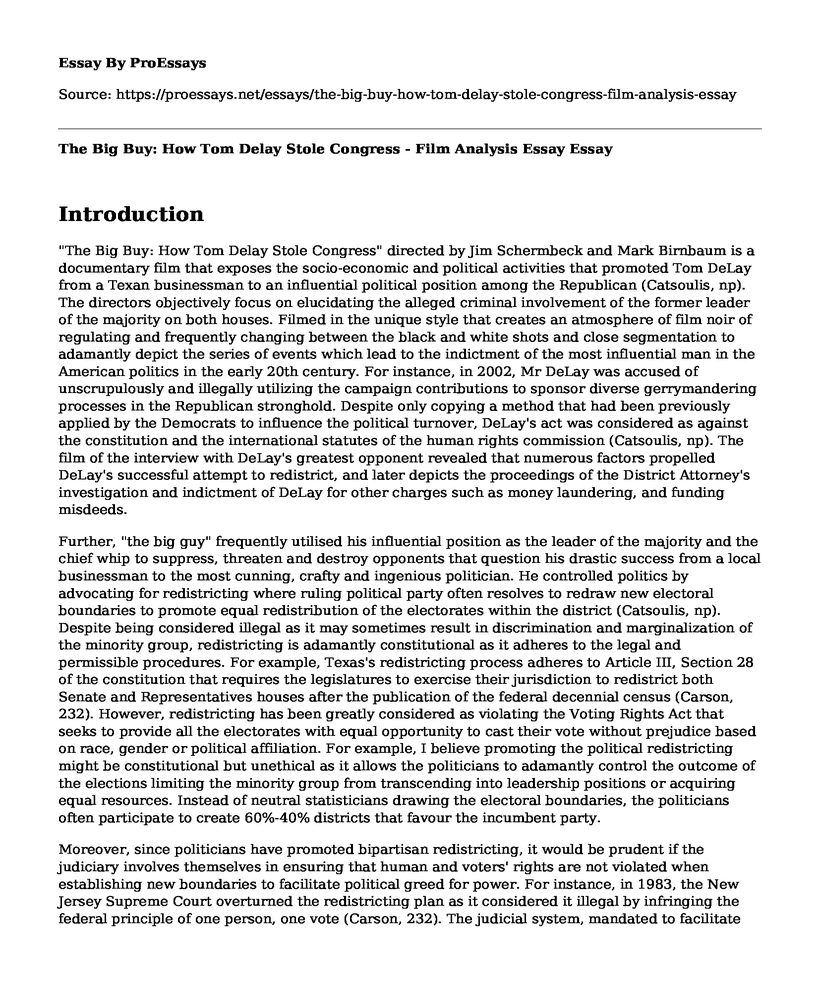Introduction
"The Big Buy: How Tom Delay Stole Congress" directed by Jim Schermbeck and Mark Birnbaum is a documentary film that exposes the socio-economic and political activities that promoted Tom DeLay from a Texan businessman to an influential political position among the Republican (Catsoulis, np). The directors objectively focus on elucidating the alleged criminal involvement of the former leader of the majority on both houses. Filmed in the unique style that creates an atmosphere of film noir of regulating and frequently changing between the black and white shots and close segmentation to adamantly depict the series of events which lead to the indictment of the most influential man in the American politics in the early 20th century. For instance, in 2002, Mr DeLay was accused of unscrupulously and illegally utilizing the campaign contributions to sponsor diverse gerrymandering processes in the Republican stronghold. Despite only copying a method that had been previously applied by the Democrats to influence the political turnover, DeLay's act was considered as against the constitution and the international statutes of the human rights commission (Catsoulis, np). The film of the interview with DeLay's greatest opponent revealed that numerous factors propelled DeLay's successful attempt to redistrict, and later depicts the proceedings of the District Attorney's investigation and indictment of DeLay for other charges such as money laundering, and funding misdeeds.
Further, "the big guy" frequently utilised his influential position as the leader of the majority and the chief whip to suppress, threaten and destroy opponents that question his drastic success from a local businessman to the most cunning, crafty and ingenious politician. He controlled politics by advocating for redistricting where ruling political party often resolves to redraw new electoral boundaries to promote equal redistribution of the electorates within the district (Catsoulis, np). Despite being considered illegal as it may sometimes result in discrimination and marginalization of the minority group, redistricting is adamantly constitutional as it adheres to the legal and permissible procedures. For example, Texas's redistricting process adheres to Article III, Section 28 of the constitution that requires the legislatures to exercise their jurisdiction to redistrict both Senate and Representatives houses after the publication of the federal decennial census (Carson, 232). However, redistricting has been greatly considered as violating the Voting Rights Act that seeks to provide all the electorates with equal opportunity to cast their vote without prejudice based on race, gender or political affiliation. For example, I believe promoting the political redistricting might be constitutional but unethical as it allows the politicians to adamantly control the outcome of the elections limiting the minority group from transcending into leadership positions or acquiring equal resources. Instead of neutral statisticians drawing the electoral boundaries, the politicians often participate to create 60%-40% districts that favour the incumbent party.
Moreover, since politicians have promoted bipartisan redistricting, it would be prudent if the judiciary involves themselves in ensuring that human and voters' rights are not violated when establishing new boundaries to facilitate political greed for power. For instance, in 1983, the New Jersey Supreme Court overturned the redistricting plan as it considered it illegal by infringing the federal principle of one person, one vote (Carson, 232). The judicial system, mandated to facilitate and uphold human rights should regulate the role of politicians in facilitating gerrymandering such as barring politicians from electing the commissions in charge of redistricting since they often have influenced the outcome. Therefore, as exposed by Schermbeck and Mark Birnbaum's film, politicians often take advantage of their powerful and prominent positions to propel unconstitutional acts to enable them to continue with their unethical and unscrupulous operations, hence the criminal justice system should immovably be involved to protect the public interest (Catsoulis, np).
Work Cited
Carson, Jamie L. "Drawing the Lines: Constraints on Partisan Gerrymandering in US Politics. By Nicholas R. Seabrook. Ithaca, NY: Cornell University Press, 2017. 160p. $49.95 cloth." Perspectives on Politics 16.1. 232-233.
Catsoulis Jeannette. On the road to an indictment in 'The Big Buy: Tom DeLay's. Stolen Congress'. The New York Times. 2006. Available at < https://www.nytimes.com/2006/05/26/movies/26buy.html >accessed on 26th February 2019.
Cite this page
The Big Buy: How Tom Delay Stole Congress - Film Analysis Essay. (2022, Dec 06). Retrieved from https://proessays.net/essays/the-big-buy-how-tom-delay-stole-congress-film-analysis-essay
If you are the original author of this essay and no longer wish to have it published on the ProEssays website, please click below to request its removal:
- Truth About Alcohol Essay
- Thoughts and Ideas About Nel Noddings and Waiting for Super Essay
- The Use of Different Lighting and Camera Angles Essay
- Trifle Drama Essay Example
- Research Paper on Social Media Use: Global Increase in the Recent Past
- Paper Example on Relative & Parallel Minors: B & E Majors' Rare Coincidence
- Reimagining Aladdin: Cultural Depictions, Character Transformations, and the American Dream in Animation - Free Essay







